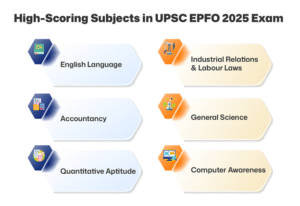If you’re preparing for the UPSC EPFO exam, one of the smartest things you can do early on is understand the UPSC EPFO syllabus inside out. With a vast range of subjects and limited time to master them, not every topic will give you the same return on investment. That’s why identifying the high-scoring subjects becomes crucial. These are the areas that, with strategic preparation, can help you gain a competitive edge.
Many aspirants make the mistake of giving equal attention to all subjects. But the truth is, not every subject carries the same weight or offers the same scoring potential. A targeted approach not only saves your time but also reduces overwhelm. Focusing on subjects that are both important and scoring helps you build confidence as you start seeing results in your mock tests and revisions.
In this article, we’ll break down the 5 high-scoring subjects for the UPSC EPFO 2025 exam, explain why they matter, and how you can prepare for them effectively. Whether you’re just starting or looking to restructure your strategy, this guide will help you channel your efforts where they matter the most.

1.English Language
Although it is often underestimated, English is one of the most scoring sections in the UPSC EPFO exam. The questions are mostly basic and test your grammar, vocabulary, and comprehension skills and nothing too advanced or tricky.
Why it scores high: It’s highly objective. You either know the rule or you don’t. Once you understand the patterns, you can solve this section quickly and accurately, giving you a scoring edge without much effort.
How to prepare:
- Brush up on grammar rules (subject-verb agreement, tenses, prepositions).
- Practice reading comprehension daily.
- Solve previous year papers to identify commonly asked question types.
2. Industrial Relations & Labour Laws
This is a core part of the exam and one that is directly related to the job profile of an Enforcement Officer. UPSC frequently asks questions on major labour laws, important provisions, and the history of labour movements in India.
Why it scores high: The scope is defined. If you cover the key acts and reforms well, you can easily answer most questions. It’s more about smart coverage rather than deep interpretation.
How to prepare:
- Focus on recent labour reforms.
- Learn sections and provisions from important acts.
- Use charts or one-page notes to revise acts quickly.
3. Accountancy
This section tests your understanding of basic accounting principles, journal entries, ledgers, and balance sheets. While it might seem challenging at first, especially for non-commerce students, it’s actually one of the most scoring once you get the concepts right.
Why it scores high: Questions are often repeated in pattern and format. With practice, you can master them quickly.
How to prepare:
- Understand fundamental concepts like debit-credit rules, types of accounts, and financial statements.
- Use beginner-friendly resources (even YouTube or Class 11 NCERT).
- Solve numerical questions daily to improve speed and accuracy.
4. Computer Awareness
This is one of the easiest areas to score, provided you’re familiar with basic computer terminology and functions. The questions are direct and don’t require in-depth technical knowledge.
Why it scores high: The syllabus is limited, and most questions are basic. Topics usually include MS Office, Internet, keyboard shortcuts, and fundamentals of hardware/software.
How to prepare:
- Make a short notebook with common shortcuts, file extensions, and basic definitions.
- Use online quizzes to test your retention.
- Don’t over prepare, just stick to the basics.
5. General Science
General Science is primarily based on Class 6 to 10 NCERTs, with most questions coming from Biology, Physics, and basic Chemistry. If covered methodically, this section can yield high returns with relatively less effort.
Why it scores high: The syllabus is predictable and finite. Many questions are factual and are asked directly from NCERTs, making them easy to answer if you’ve revised well.
How to prepare:
- Read NCERTs from Class 6 to 10, focusing more on Biology and Physics.
- Make crisp notes with definitions, diagrams, and commonly asked facts.
- Revising multiple times and solving topic-wise MCQs will help build confidence.
Bonus High Scoring Subject: Quantitative Aptitude
Quantitative Aptitude is another subject that can significantly boost your score if practiced consistently. Though not in the top five for everyone, aspirants with good numerical ability can turn this into a scoring area by mastering key topics like percentage, ratio, time & work, and number series. Regular practice under timed conditions is the key to cracking this section.
When you look at the UPSC EPFO syllabus strategically, it becomes clear that not all subjects are created equal. These five subjects – English, IR & Labour Law, Accountancy, Computer Awareness, and General Science with Quant, are your scoring pillars in the UPSC EPFO 2025 exam. Master them with focus and consistency, and you’ll walk into the exam hall with both confidence and clarity.











